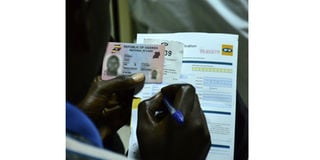How police officers extort money for Sim card renewal

Replacement. An agent registers a customer for Sim card replacement at one of the MTN outlets in Kampala last year. FILE PHOTO
Officers at Masaka Central Police Station have been accused of soliciting money from unsuspecting residents who turn up at the police station to report lost items.
It is a requirement to present a police letter if one wants to replace stolen or lost items or documents.
According to Daily Monitor investigations, complainants who report lost items at the police station are charged between Shs5,000 and Shs15,000 depending on the value of the item. Residents who lose their mobile phones and want to replace Sim cards frequent the police station to secure letters.
On average, between 20 to 30 people report lost Sim cards at the police station, according to a police detective, who preferred anonymity while speaking about the cases of lost items.
“On some days like when there is a musical show or beach outing, the number of complainants shoot to 50,” the detective said during an interview on March 20.
If each complainant is charged Shs10,000. This means the police officers who records the cases on average pocket between Shs200,000 and Shs300,000 per day, which translates to between Shs6m to Shs9m per month.
Mr Kenneth Masiriwa, a hawker in Masaka Town, says he was charged Shs10,000 at Masaka Central Police Station in exchange for a police letter after losing his mobile phone last December.
“When I went to Airtel Service Centre in Masaka Town to replace my Sim card, I was told to first get a police letter before they process a new SIM card,” he says.
“At Masaka Central Police, the officer at the front desk asked me to pay Shs 10,000 which I did,” Mr Masiriwa adds.
Common trend
What happened to Mr Masiriwa is not new, according to many dwellers in Masaka Town.
Some consider paying some money to secure a police letter as normal since they do the same to get a police bond which is supposed to be free.
Mr Ivan Balitan, a resident of Kimaanya Village, Masaka Municipality, says he has paid money twice to police officers to replace his Sim card since 2016.
“Sometimes the officer at the reception will boldly ask for ‘something’ to quench his thirst and many times one will specifically ask for a certain amount of money, which many people consider normal,” he says.
Losing personal gargets like mobile phones and lap tops is common among many Ugandans as thugs rough up people walking in dark streets or isolated places.
Some thugs steal the property when they break into houses, offices or leisure places.
Mr God Kwesiga, a mobile money attendant, operating near Masaka Central Police Station, says some police have their own agents who charge an extra fee of Shs2,000 to replace a Sim card.
On his part, Kwesiga says he receives about 20 people who want to replace Sim cards daily.
“After recording a case at police, you are directed to a photocopier opposite the station where they pay the agents some money and who also gives out police forms at Shs500 per form. Almost all the mobile money agents where people register for new Sim cards and the photocopying machines near the police station are owned by officers at the station,” he says.
The outgoing southern regional police spokesperson, Mr Paul Kangave, says although some people report cases of lost items, others don’t.
He also refutes claims that police officers extort money from people who report lost items.
“On average, I think we record between five to 10 cases of lost mobile phones daily at Masaka Central Police Station, this is not different from other districts neigbouring Masaka like Kalungu, Bukomansimbi, Rakai, and Kyotera districts. Some people prefer to get new Sim cards other than going through the long process of replacing an old Sim card,” he says.
Mr Swaibu Makumbi, the chairperson of Masaka Social Rights Defenders, says the vice of extorting money from people who report cases of lost items at police stations is growing and has also extended to police posts.
“We are wondering what is wrong with some police officers of today, whatever service they offer to the public, they ask for some money. We appeal to the office of the Inspector General of Police to investigate this vice and bring to book all cops who are doing this,” he says.
Need for intervention
Mr Makumbi asks telecom companies to consider other means of replacing customers’ lost Sim cards without necessarily asking for a police letter.
“A police letter should only be a requirement for replacing other items such as driving permits, passports, and National Identity Cards, not replacing Sim cards. Mobile phones get lost every day and police officers have turned it into a money minting business,” he adds.
Mr Kangave insists a police letter is free and individuals who complain of having been asked for money usually fail to make formal complaints to warrant police authorities to reprimand the culprits.
“The public is aware of how one can report any officer or any bad act by our officers, but we have not received any formal complaint, we usually learn about such issues through the media,” he says.
Surveys
In 2012, the police force was named the most corrupt institution in the country in an annual corruption report by the Inspectorate of Government in collaboration with the Economic Policy Research Centre of Makerere University.
The National Service Delivery Survey of 2015 carried out by Uganda Bureau of Statistic (Ubos) indicated that Ugandans believed the Uganda Police Force was the most corrupt institution in the country. The Ubos survey based on 10,101 Ugandan respondents put the police at 75 per cent as far as bribery, fraud and extortion are concerned.
In the same year, Uganda police was ranked the most corrupt institution in another survey conducted by The Afrobarometre in conjunction with Transparency International.
The study that was dubbed People and Corruption: Africa Survey 2015 in 36 countries across the Africa region put the police at 63 per cent.
More than 69 per cent of Ugandan respondents said corruption was generally on the rise.




